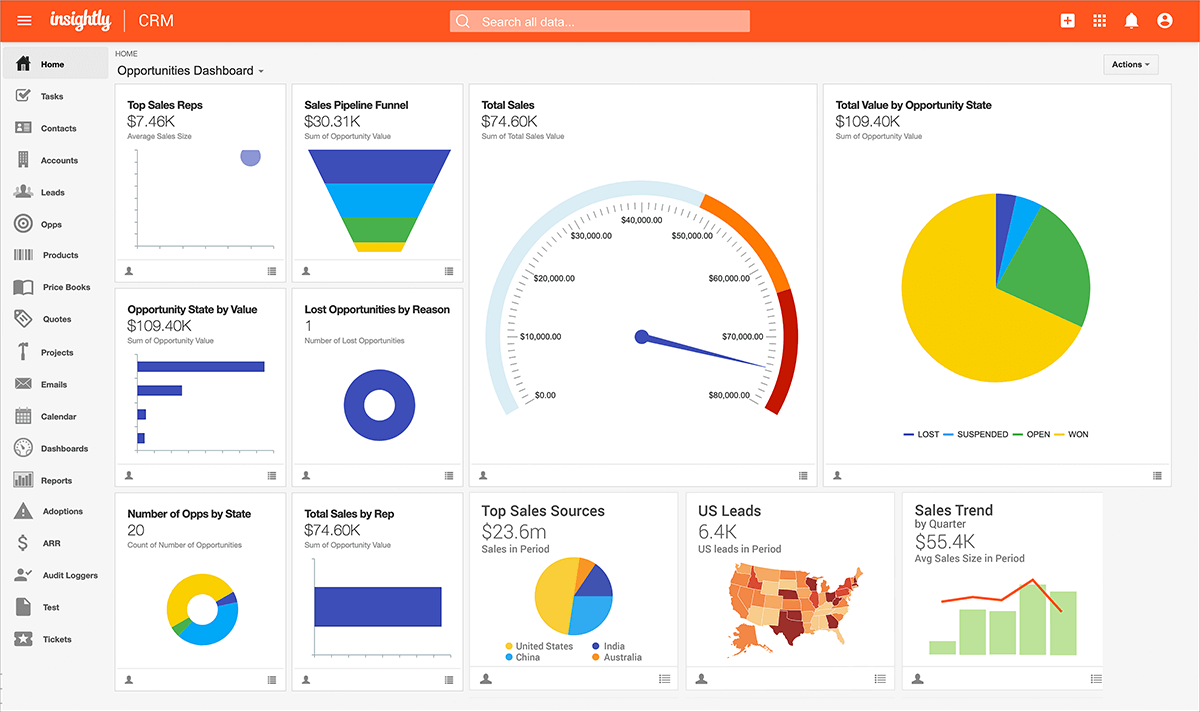Business & tech
Top CRM trends for 2021
The history of customer relationship management spans over five decades and has spurred the continuous evolution of CRM technology. The global CRM market was valued at $47.79 billion in 2019 and is projected to reach $113.46 billion by the year 2027, exhibiting a growth rate of 11.6%. It’s a lucrative business.
Customer experience (CX) and satisfaction are some of the driving forces behind modern business success. To meet customer-centric goals, new CRM tools with greater precision are being developed.
Every year, new trends come up in the CRM space. Keeping track of these trends will help you plan ahead, meet changing business needs, and gain a competitive edge.
So, here are the top CRM trends for 2021.

IoT technologies
IoT stands for “the internet of things” and is used to describe a network of physical objects that are tied to the internet through sensors, scanners, software, and other technologies.
In 2019, it was estimated that 93% of enterprises had adopted IoT technologies and by the year 2025, there are expected to be over 64 billion IoT devices worldwide.
One of the main purposes of connecting the physical and digital worlds is the exchange of information. There has been an upward tick of CRM integrations with IoT tech to make life a little easier.
Enriched IoT data
IoT technology helps to monitor and service clients in proactive ways. Data generated from these solutions is used to increase customer satisfaction and retention.
CRMs are integrating with compact resources that have flexible offline/online capabilities, such as:
- Wearable monitors
- GPS systems
- Cybersecurity scanners
- Smart appliances
- Energy meters
- And more…
These advanced solutions lead to greater visibility and cost efficiencies. The more mobile people become, the more IoT integrations we will see.

Workflow automation
Automation-enabled self-service is another emerging trend in 2021. The concept of self-help in the CRM world is catching on.
New virtual assistants are designed to not only ask questions, but engage customers, sum up details, and provide productive and personalized answers. Artificial intelligence (AI) can then automatically guide users through sales and marketing pipelines.
This synergy has enabled chatbots to complete more contact management tasks without any human interference. They can quickly guide users through the right channels and provide actionable insights. Integrate that with a CRM, and you have an entire workflow that’s completely run by machine learning.
This extends to email communications as well. The concept of self-service CRMs means customers get quicker answers with little to no effort on the part of employees. Entire drip campaigns can be automated to nurture sales prospects down the funnel.
Workflow automation enables a business to offer high-quality customer service while optimizing operational costs. This is something that CRMs are supporting in new and innovative ways.

Flexible APIs
In CRM, APIs are the roadmap to customer intelligence. An API is what integrates platforms together. It is the glue that binds enterprise systems and helps to capture greater revenue growth.
Flexible APIs create a valuable record of customer preferences, while driving successful strategies. It’s one of the key technologies that enable cloud-based CRM applications to flex in response to sales and marketing needs. They’re fueling an unprecedented level of data-driven insights.
Additionally, CRMs with open API integration are enabling entirely new business models. As the development becomes increasingly customer-centric, APIs allow for greater versatility and flexibility in designing custom:
- Workflows
- Graphical user interfaces (GUI)
- Screen designs
- Process steps
Over time, APIs will redefine the nature of how cloud-based CRMs operate. Today, nearly every CRM will offer API features (some more scalable and mature than others).
Cloud-based CRMs have enterprise-grade APIs that orchestrate a wide variety of databases. Cloud management is helping APIs become more customer-oriented by providing scalable integration frameworks and technologies. This allows for greater collaboration across departments, teams, divisions, and channels.
APIs are facilitating a new era of integrated CRM systems that are innovative and data-driven.

Dynamic user interface
One of the top CRM trends for 2021 also involves dynamic user interfaces. As CRMs evolve, the need to manage multiple functions in one spot becomes apparent. Rather than using separate systems for sales, marketing, service, and operations, new CRM dashboards are multifaceted.
A business can condense robust sales and marketing tech stacks into a single spot. Brands like Insightly provide several dashboards for universal insight. Toggle between opportunities, projects, and leads with a simple click. Colorful visuals that include charts, graphs, and gauges help a business assess important data at a glance.
Dynamic CRM dashboards display a quick overview of your most critical reports. It presents complex information that’s easy to digest and share with the team. As CRMs continue to evolve, the user interface will convey more and more data streams, in less amount of time.

Voice & conversational AI
As technology like Alexa and other voice-activated hardware hit the market, business software will soon follow. Customers are getting comfortable with conversational AI and this means, CRMs are following suit.
According to an Adobe report on voice technology, 94% of users consider voice technology not only easy to use, but state it also improves the quality of life.
That means that conversational apps are critical for the evolution of CRM tools. Voice technology is a key factor for accessibility and helps to increase user engagement.
Voice-assisted virtual assistants within CRM infrastructures are helping salespeople track, manage, message, update, and notify teams about customer data in real-time. This leads to faster decision-making and a quicker close.
In the near future, you should expect to see an increase in the usage of voice assistants and supporting hardware in CRM processes and interfaces.
One last thought
Most trends in CRM are influenced by brands that can quickly pivot to meet evolving customer needs. In order to stay relevant to tech-savvy consumers, top CRMs need to offer tools with advanced automation, IoT integrations, flexible APIs, a dynamic user interface, and conversational AI technology.
Does that seem like a big ask?
Not really. The truth is, most of this technology is currently in place. More intelligent and contextually-aware CRM applications already incorporate machine learning, AI, and business intelligence.
The companies that are getting ahead use CRMs to build lasting customer relationships, drive sales, measure performance, and contribute to business growth; all while keeping customer satisfaction at an all-time high.
According to a study by McKinsey & Company, customer relationship management platforms will continue to outpace all other business software growth. This is because the technologies and strategies that CRM applications support contribute directly to new customer acquisition and retention, gross margin growth, and a healthy return on investment.
If you’re looking for a CRM that stays on top of trends, Insightly is a great place to start. You can try it for free, with zero commitment.